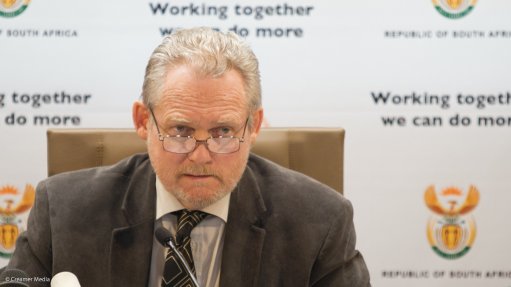
Trade and Industry Minister Dr Rob Davies
Photo by: Duane Daws
JOHANNESBURG (miningweekly.com) – A call for platinum-rich South Africa to commit to 1 000 MW of platinum fuel cell-generated electricity by 2020 was made on Tuesday evening during the unveiling by Trade and Industry Minister Rob Davies of Africa’s first platinum fuel cell baseload power unit, which has been installed at the Chamber of Mines building in Johannesburg.
Mashudu Ramano, chairperson of Mitochondria Energy, the black-led company responsible for the installation of the 100 kW unit that will cost the chamber 20% less than the going rate for electricity over a 15-year period, said the 1 000 MW commitment would help alleviate power insecurity, stimulate demand for platinum and set the country on the road to the local manufacture of fuel cells.
Mitochondria CEO Anthea Bath calculated that while 1 000 MW would only represent 2% of South African power supply, it would create demand for 5% more platinum metal and if 1% of cars were fuel cell powered, it would create demand for 20% more platinum metal.
Impala Platinum (Implats) CEO Terence Goodlace outlined that because platinum was recycled to such a high degree, it was essential for the mining industry to take steps to expand the market for the metal.
Goodlace outlined to applause that Implats was taking steps to install 1.8 MW of platinum fuel cell back-up power at the its platinum refinery in Springs and would later add much more fuel cell power to enable the company to come off the Eskom power grid completely.
The company also intended installing platinum fuel cells in mining equipment to create a clean air environment in its underground platinum mines.
“The window of opportunity to do this is now wide open,” said Goodlace.
Davies, who committed government to removing every obstacle in the way of the introduction of local power fuel cell manufacture in special development zones, said an early harvest for the new technology would be in off-grid industrial estates, outlying areas, data centres, cellphone masts and back-up power units.
Industrial Development Corporation (IDC) CEO Geoffrey Qhena committed the IDC to supporting the new technology and helping to develop a local supply chain that would include local component manufacture.
Fuel cell power-generation units come with high capital expenditure and low operating expenditure efficiencies in the provision of clean power.
The noiseless unit has no moving parts and requires very little maintenance.
Japanese Ambassador Shigeyuki Hiroki said South Africa’s current power crisis had opened the market for energy and the fuel cell could create the best clean energy alternative for South Africa.
Mitochondria is partnering Japan’s Fuji Electric, which is a major technology provider for fuel cells, which convert chemical energy into electrical energy using platinum as a catalyst.
Fuel cells generate electricity from an electrochemical reaction in which the oxygen in the air and hydrogen combine to form water.
The chamber’s natural gas-fuelled system has been designed to supply between 30 kWh and 80 kWh of electricity, depending on periods of low or high demand.
Johannesburg’s Egoli Gas is contracted to supply the natural gas for the fuel-cell system, which cost $1-million and took ten days to install and commission.
A laptop-sized 5 kWh fuel-cell system was used to power the sound and projectors at Tuesday night’s unveiling event, which is indicative of the wide range of fuel cells available to provide power.